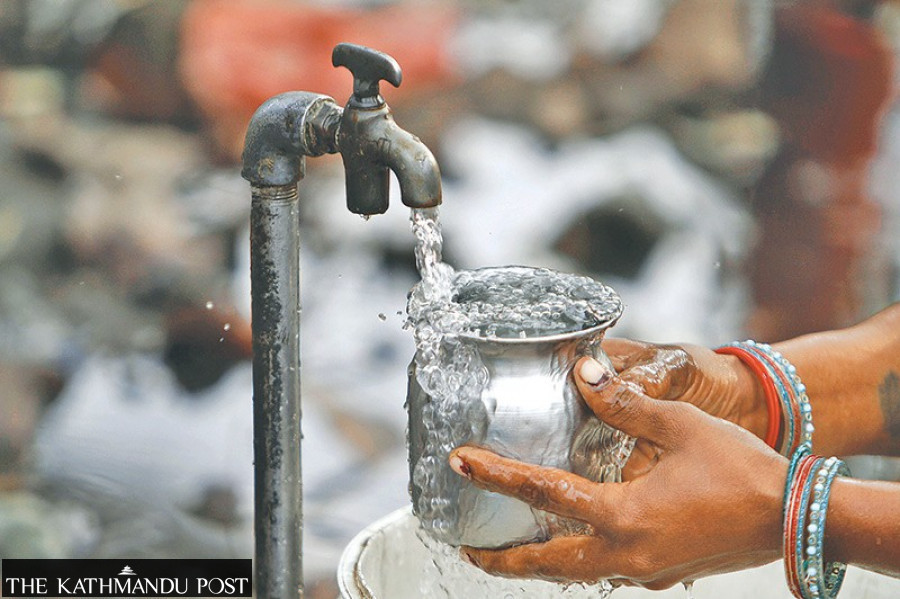Health
Cholera resurfaces in districts declared open defecation-free years ago
Without improved water and hygiene, there is no stopping deadly diarrheal ailments.
Arjun Poudel
Five years ago, on September 30, 2019, when KP Sharma Oli was prime minister for the second time, the government declared the entire country open-defecation free amid much fanfare. However, years later, thousands of people from across the country are getting infected with diarrheal diseases, including scores from cholera.
Rautahat is among the nine districts reporting cholera outbreaks this year. Ward 4 of Rajpur Municipality has reported over 100 cases of diarrheal infection and hospitalisation. However, the Epidemiology and Disease Control Division said only 12 people from the municipality had so far contracted cholera.
“Over 100 diarrheal patients from the municipality’s ward 4 have been hospitalised,” Khusid Ahmad, a health worker at the municipality, told the Post over the phone from Rautahat. “Contaminated drinking water could be the culprit for the cholera outbreak there. Samples of drinking water collected from affected areas have been sent for lab tests.”
Apart from Rautahat, eight other districts—Lalitpur, Kathmandu, Kailali, Pyuthan, Makawanpur, Rolpa, Sindhupalchok, and Achham—have also reported cholera outbreaks this year. So far, the number of diarrheal patients who have contracted cholera is 95. Interestingly, most of the districts that have witnessed outbreaks of deadly cholera this year had years ago been declared open defecation-free.
The Vibrio cholera 01 Ogawa serotype has been confirmed in the stool samples of the infected patients. Doctors say that detected cases of cholera infection could be just the tip of the iceberg, as most positive cases are being reported from the districts with active surveillance.
Public health experts say outbreaks of cholera in multiple districts, even five years after the country was declared open defecation-free, show a huge gap between official declarations and progress on the ground.
They say outbreaks of diarrheal diseases, including cholera, are directly linked to drinking water, sanitation, and hygiene conditions, and the country was declared open defecation-free without improving water and sanitation conditions.
“Without ensuring the quality of drinking water and sanitation, among other things, authorities rushed to declare the entire country free from open defecation,” said Dr Mingmar Gyelgen Sherpa, former director general at the Department of Health Services. “Instead of improving basic water and sanitation infrastructure, we’ve focussed too much on outbreak management, and this is the wrong approach.”
Even though toilets have been built in most households, open defecation is still widespread in many places. Drinking water samples collected from various parts of the country, including from the districts of the Kathmandu Valley, have been found contaminated with faecal coliform, which means the water the public uses for drinking is unsafe. The presence of faecal coliform, a microscopic organism that thrives in the intestines of warm-blooded animals or their faeces, indicates sewage contamination in the drinking water, according to doctors.
A previous study had shown that 81 percent of water samples collected in the Kathmandu Valley were contaminated with deadly microbes.
“We only focussed on expanding coverage of drinking water but did not pay attention to ensuring its safety,” said Dr Meghnath Dhimal, chief researcher at the Nepal Health Research Council. “Authorities concerned must also focus on improving the quality.”
Experts say improving public hygiene is essential to ensuring water quality and avoiding diarrheal ailments. Awareness drives and health education play a crucial role in changing behaviours, which requires years of investment and continuous efforts.
Along with investment in health education, attention should go to building climate-resilient infrastructures for drinking water and sanitation, as water resources have been contaminated by floodwaters in many districts. The effects of climate change have increased adverse events, including floods, which in turn have contaminated the source of drinking water, making people vulnerable to infection with diarrheal ailments.
“Multiple agencies of the three tiers of government and non-governmental sectors have to make more effort to prevent diarrhoea outbreaks,” said Sherpa. “But there seems to be a lack of coordination among government agencies.”
The World Health Organisation also stresses on a multifaceted approach as a key to controlling cholera and reducing deaths.




 23.12°C Kathmandu
23.12°C Kathmandu















